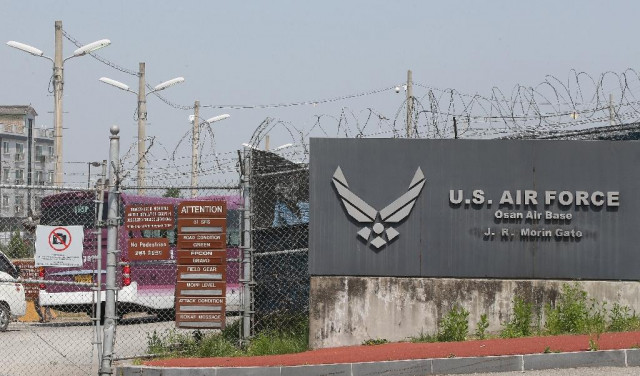More mistaken anthrax shipments than first reported: US military
The Pentagon has already admitted to blunders that include live anthrax spores being shipped

The US military said there was "no risk" to the public after the live anthrax sample was sent to the Osan Air Force Base in Pyeongtaek, South Korea. PHOTO: AFP
Pentagon officials insisted there was no threat to public health but said the latest numbers showed live anthrax spores were shipped to 51 labs in 17 states and the capital Washington, as well as to Australia, Canada and a US base in South Korea.
A US Army lab sent a live sample of anthrax to Canada by mistake and may have sent the deadly bacteria to the Pentagon's police force as well, officials said Tuesday.
The latest discoveries raised fresh questions about the Defense Department's handling of the lethal material and the extent of the problem involving mistaken shipments of anthrax.
As a spate of embarrassing details emerged over the past week, defense officials acknowledged it was unclear how many government or commercial labs could have received the vials.
"We can confirm that yesterday we determined that we had shipped anthrax to Canada," Pentagon spokesperson Colonel Steven Warren said.
The sample came from a larger batch or "master sample" that tested as "live," he said.
The live anthrax sample was sent to a lab in Alberta province, said a defense official on condition of anonymity.
The material had been irradiated at the US Army's Dugway Proving Ground in Utah, but for some reason the bacteria was not rendered inactive as intended.
Authorities also are testing anthrax samples from the Utah lab that were sent to the Pentagon Force Protection Agency, which guards the Defense Department, officials said.
The samples, which were supposed to be inactive, were to be used to help test gear designed to detect biological or chemical agents.
Officials said the samples are being tested in a laboratory near the main Pentagon building just outside Washington, which serves as the headquarters for the US military.
The Pentagon has already admitted to blunders that include live anthrax spores being shipped to laboratories across the United States as well as to Australia and South Korea.
Two other batches of live anthrax have been found at Dugway Proving Ground.
Samples from that material have been transported to at least 28 labs in at least 12 US states. And officials said that the number is likely to go up as an internal inquiry progresses.
As a precaution, 27 people were receiving preventative medical treatment, including 22 military and civilian personnel at Osan Air Base in South Korea.
But US officials said there was no threat posed to public health and no suspected cases of infection. And the vials sent out with samples contained such small amounts of anthrax bacteria that even if ingested, it would not prove lethal, officials said.
Pentagon investigation
Last week, the Pentagon announced a 30-day investigation to get to the root of the problem and to examine protocols at all military labs handling anthrax. The probe is being led by Frank Kendall, undersecretary of defense for acquisition, technology and logistics.
The inquiry will look at whether the irradiation process used to inactivate anthrax bacteria was inherently flawed or whether human error was to blame.
If a technical glitch is the cause, then other army labs could be implicated and the scope of the problem would extend beyond the Dugway Proving Ground facility.
The lab in Utah routinely transfers "dead" anthrax samples for scientific research and the lab had been working on a project to detect biological threats in the field.
As a precaution, the Defense Department has stopped anthrax shipments pending the investigation.
Senator Barbara Mikulski of Maryland and other lawmakers have expressed outrage at the revelations about the mistaken shipments.
In a letter to Pentagon chief Ashton Carter and Centers for Disease Control and Prevention head Thomas Frieden, Mikulski said she had "serious concerns about how such a potentially catastrophic mistake could have been made."
Microscopic anthrax spores can be released without being detected and can be placed in powders or food.
In 2001, powdered anthrax spores were found in letters mailed in the United States. Out of 22 people who were infected, five died.
Anthrax spores are deadly unless a patient is promptly treated with large doses of antibiotics.



















COMMENTS
Comments are moderated and generally will be posted if they are on-topic and not abusive.
For more information, please see our Comments FAQ